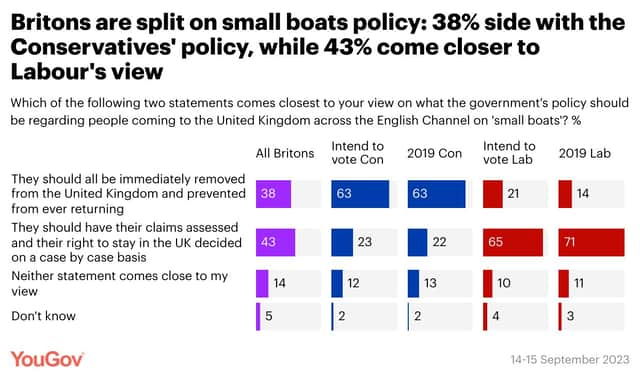Suella Braverman: polls show hard-line immigration speech risks alienating potential Conservative voters
and live on Freeview channel 276
Suella Braverman launched her future Tory leadership campaign in Washington DC with a hard-line anti-immigration speech saying multiculturalism has failed.
The Home Secretary took aim at the UN Refugee Convention - with the UK signed up to after the Second World War - and said illegal migration posed an “existential challenge” to the West. She claimed that “uncontrolled immigration, inadequate integration and a misguided dogma of multiculturalism” has impacted “social cohesion” in the UK.
Advertisement
Hide AdAdvertisement
Hide AdBraverman also claimed that thousands of extra places in schools will need to be created due to “high birth rates among foreign-born mothers”, and said that “heightened levels of criminality connected to some small boat arrivals”.
It was similar rhetoric to that used by far-right groups, and it was no surprise to hear Braverman was endorsed by Britain First. The group’s leader Paul Golding, who has previously been convicted of religiously aggravated harassment, said it showed mainstream thinking has caught up with the “so-called far-right”.
Politico reported that Number 10 had signed off the speech, with the “normal process” of approval - and it is a continuation of the government’s hard-line approach to illegal migration as it seeks to close ground on Labour ahead of the next election.


Right-wing Tory MPs such as Brendan Clarke-Smith claimed that she was “speaking the same language as my constituents, it’s what they wanted to hear”. However, when looking at the most recent polls - this rather extreme approach may cause the Conservatives more harm than good.
Advertisement
Hide AdAdvertisement
Hide AdA YouGov poll, carried out on the 14 and 15 of September, found that there is a slight preference (43%) to the Labour position on illegal migration - which is to process the claims - than the Tories’ policy (38%) of immediate removal.


Author Patrick English wrote on X: “I think it debunks two important things:
“1) That the British public *necessarily* have a hardline position on 'small boats'. Measuring support for government policy in isolation is not the same as measuring policy preferences, as this finding shows.
“2) Early takes on Labour's immigration policy announcements as facing a 'backlash' or driving voters away from Labour were misguided. There was little data to back these claims up in the first place, but these findings throw real doubt on those particular ideas.”
Advertisement
Hide AdAdvertisement
Hide AdAnd while the data shows that 14% of Labour voters in 2019 prefer the government’s policy, and 21% people who intend to vote Labour at the next election, these figures are higher when looking at Tory voters who prefer Keir Starmer’s stance.
Almost a quarter of voters who intend to vote Conservative believe illegal migrants should have their claims assessed on a case by case basis. Patrick said: “With a quarter of his base in disagreement, is there an argument that Sunak might be at risk of following a 'one step forward, two steps back' strategy?”
Despite the percentages of intended voters disagreeing with their favoured party’s policy being quite close - immigration is a bigger issue for Tories, meaning it’s more likely to influence voting intention.
According to YouGov’s tracker, immigration is currently the most important issue facing the country for Tory voters, with 59% saying this, above the economy, health and crime. While amongst Labour voters, just 12% say it’s the biggest issue - which is below housing, education and the environment.
Advertisement
Hide AdAdvertisement
Hide AdThis means that while prospective Labour voters may disagree with Starmer’s policy, it’s less likely to be the defining issue when they come to vote.
On top of this, Rishi Sunak has pledged to “stop the boats” - a promise he may come to regret. The government’s “small boats week” was a disaster, with the Bibby Stockholm barge having to be evacuated due to deadly bacteria being found in the water supply, and the asylum backlog recently reached record levels. The flagship Rwanda policy has been ruled unlawful by the High Court.
And since November 2022, Labour is polling higher than the Tories in terms of which political party would be best at handling asylum and immigration. So despite the Conservatives trying to use migration as a wedge issue, the public is not as hard line as Suella Braverman and Rishi Sunak would hope.
Comment Guidelines
National World encourages reader discussion on our stories. User feedback, insights and back-and-forth exchanges add a rich layer of context to reporting. Please review our Community Guidelines before commenting.
